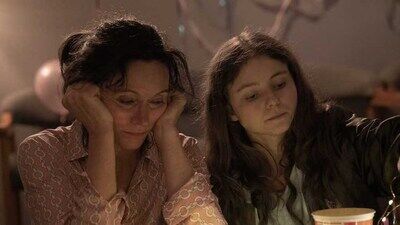Effective storytelling is usually grounded in detail. “The Justice of Bunny King,” an amazing directorial debut from Gaysorn Thavat, is full of details like the bra. Details bypass condescension, and so many films about what is referred to as “the working class” stink with condescension. The recent “Holler” was a notable exception, as are the films of Eliza Hittman. It’s refreshing when you don’t sense the actors are only in the location for six weeks, with Los Angeles on speed dial right offscreen. Everything in “The Justice of Bunny King”—the clothes, the car, the decor, Bunny’s sharpened eyeliner pencil, the plastic cake box, the worn-out bra—hasn’t been carefully placed in the frame. They were there before the camera started rolling, and they will be thereafter.
Bunny’s kids, Ruben (Angus Stevens) and Shannon (Amelie Baynes), have been taken away from her, for reasons not revealed in full until near the film’s end. The kids are in foster care, and Bunny is allowed short visits, all while a social worker hovers on the sidelines. Ruben is a teenager, and wary of his mother. Shannon is a small disabled child, clinging to Bunny, but young enough to call her foster mom “Mommy” too. Bunny cannot regain custody of her kids until she has a job and adequate housing, but how can she find adequate housing with just a jar of coins? In the meantime, she crashes with her sister Sylvia (Darien Takle), Sylvia’s husband Bevan (Erroll Shand), and Bunny’s niece Tonya (Thomasin McKenzie). There’s tension. Bunny cooks and cleans, feeling like she is imposing on the family. There’s a limit to her sister’s generosity. Then, one day, Bunny witnesses something, something terrible. She calls it out, shattering the already fragile family dynamic. Bunny is tossed out of the house, her stuff (except for the coin jar) dumped out the window.
It’s obvious from Bunny’s face that she is running on fumes: there’s hysteria at play, an urgent and off-putting energy. People recoil from her. She can be a little bit scary, especially when she is angry or desperate. But her life is desperate. Even having time to think is a luxury. The social worker sets her up with a “dress for success” consultant, crucial to making a good impression when looking for an apartment or a job. Bunny staggers down the sidewalk in white platform sandals and a tailored blue suit, trying on a competent and confident personality. But people eventually see through it to the raw need underneath. When cornered or frustrated, Bunny makes big bold choices, and many of these choices are beyond the pale, putting her into a state from which she cannot retreat. Eventually, Tonya runs away from home to join up with her outlaw aunt, trailing along as Bunny barges into social workers’ offices, filling out forms with impatience bordering on fury. Tonya has her own trauma but being with Bunny is better than being at home.
























































![Key Metrics for Social Media Marketing [Infographic] Key Metrics for Social Media Marketing [Infographic]](https://www.socialmediatoday.com/imgproxy/nP1lliSbrTbUmhFV6RdAz9qJZFvsstq3IG6orLUMMls/g:ce/rs:fit:770:435/bG9jYWw6Ly8vZGl2ZWltYWdlL3NvY2lhbF9tZWRpYV9yb2lfaW5vZ3JhcGhpYzIucG5n.webp)


















